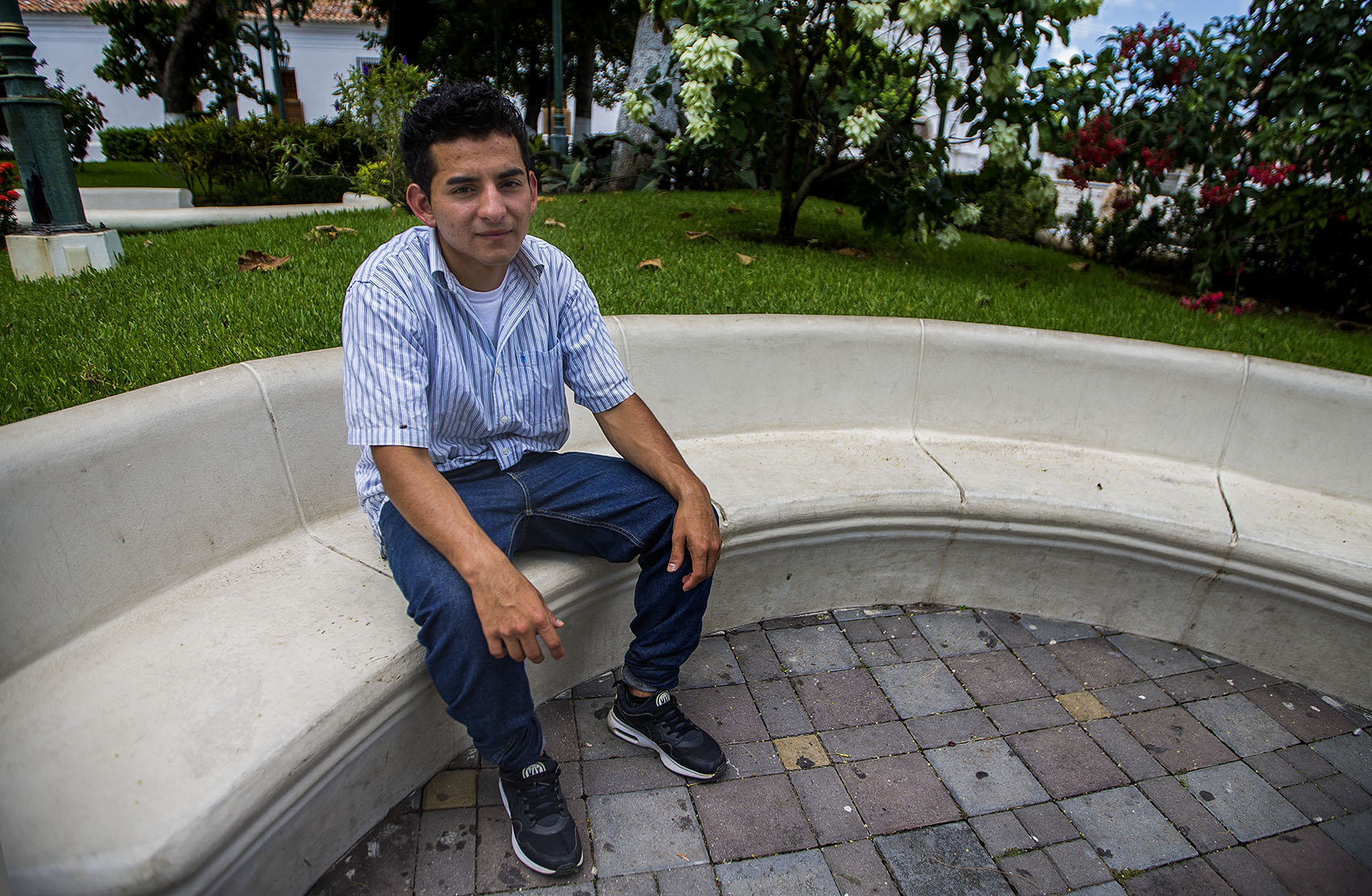Episode 124: What A Student’s Deportation Reveals About School Police And Gangs; Iranian Families Reunite At The Canadian Border

This week we learn how an argument in an East Boston high school set off a series of events that led to a young man’s deportation. Plus, Iranian students living in the United States who were separated from their families due to the travel ban find a place to reunite along the U.S.-Canada border. We also speak with Vermont Congressman Peter Welch about legislation he has co-sponsored that would reduce the U.S. Customs and Border Protection checkpoint zones from 100 miles down to 25.
And, we learn more about the electricity market that keeps the power on throughout New England. Finally, we listen to a Middle Eastern music group in Western Massachusetts and preview a play that takes the audience into barbershops around the world.
It’s NEXT.
How a High School Argument Set Off a Deportation
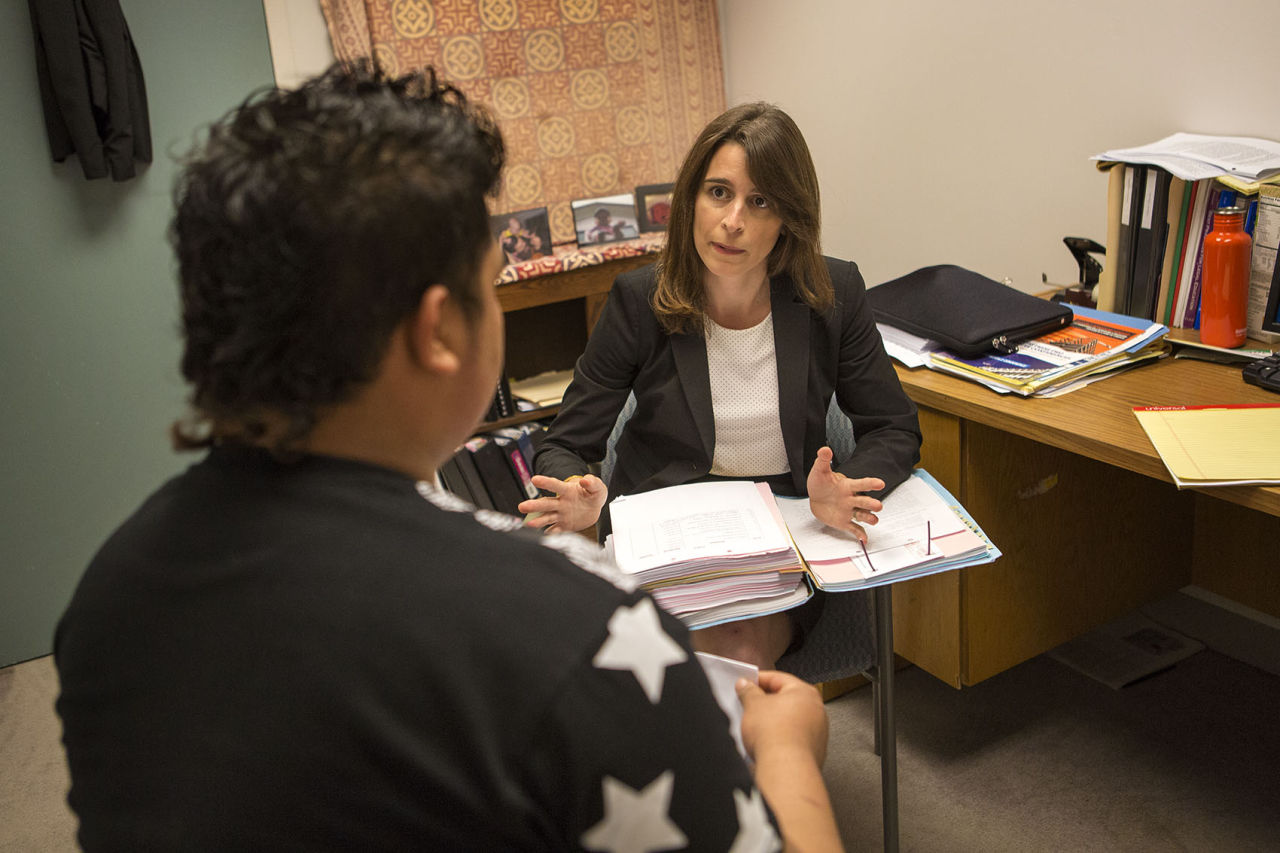
Sarah Sherman-Stokes is a clinical teaching fellow at Boston University’s Immigrants’ Rights Clinic. Photo by Jesse Costa for WBUR
It was a lunchtime argument among East Boston High School students that quickly fizzled. But what transpired that day in the cafeteria set a series of actions in motion. Three years later, the repercussions are still unfolding for one young man named Orlando.
As WBUR’s Shannon Dooling reports, his story shows how a seemingly mundane high school argument was reported to federal immigration officials.
Separated Families Reunite Inside A Border Library
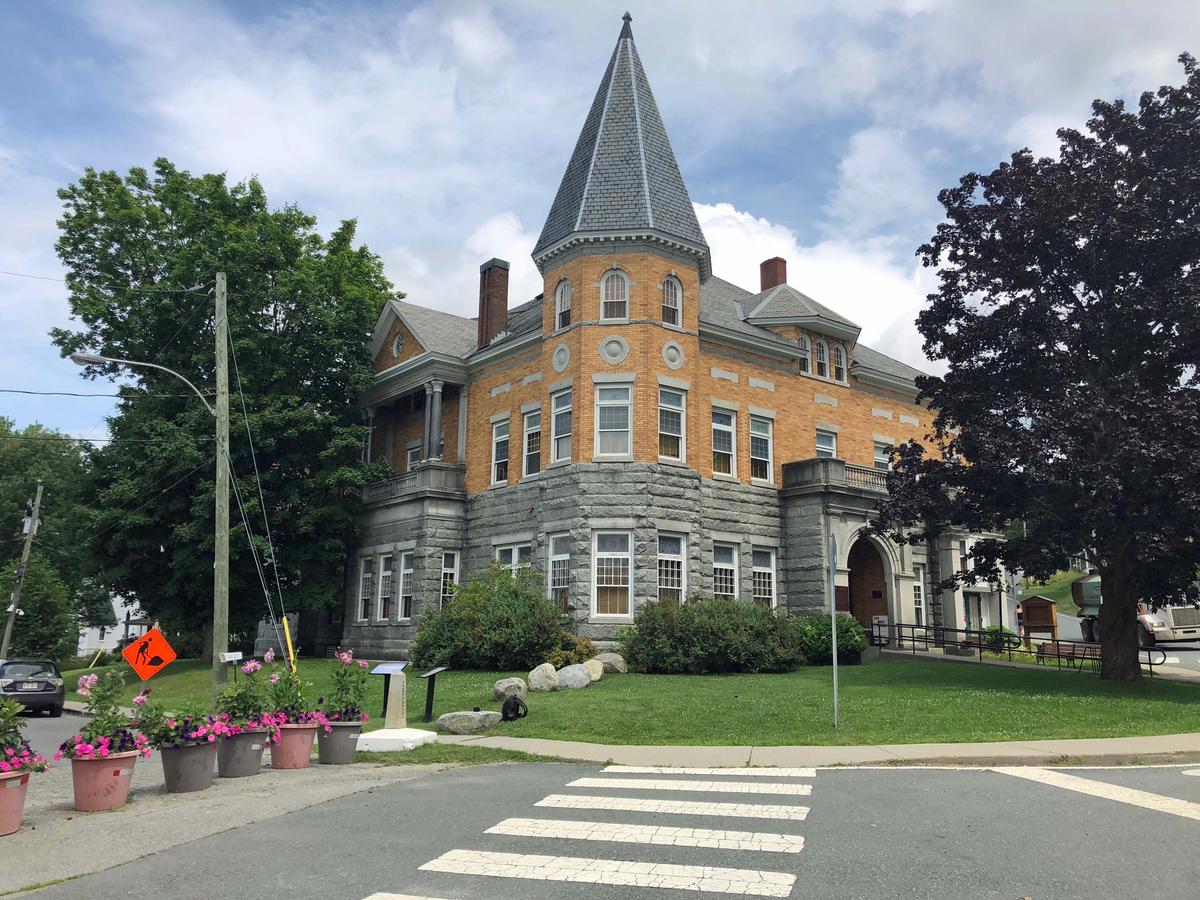
Flower pots and landscaping stones mark the international border between Stanstead, Quebec, and Derby Line, Vt. Inside the Haskell Free Library and Opera House, the border is marked by a line on the floor. Photo by Amy Kolb Noyes for VPR
For those living in the United States with a single-entry visa, it’s difficult or even impossible to leave the country to visit family, and then re-enter. In recent years, the Trump administration’s travel ban has made it harder, barring individuals from certain countries from entering the U.S. For some families, it can be years between visits.
But a library that sits on the border between the United States and Canada is offering a unique way for families to reunite. The Haskell Free Library and Opera House, in Derby Line, Vermont, and Stanstead, Quebec, is serving as a space where Iranian families can legally meet.
Yeganeh Torbati, a reporter for Reuters, wrote about the library and the reunions taking place there. She joins us to describe what’s happening inside the library.
Changing The Border Zone
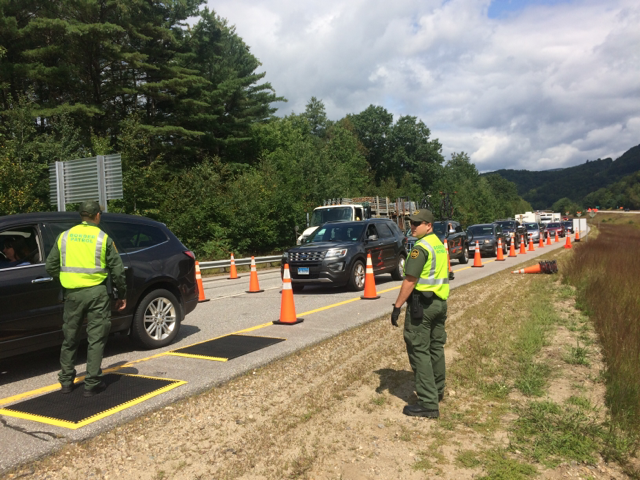
Last August and September, the U.S. Border Patrol set up checkpoints on the southbound lanes of I-93 near Woodstock, New Hampshire.
While the library is actually on the U.S.-Canada border, the border zone that is patrolled by U.S. Customs and Border Protection is bigger. CBP agents are allowed to set up immigration checkpoints within 100 miles of any U.S. border, and that zone includes almost every square mile of New England.
Vermont Congressman Peter Welch is working to change those parameters. He’s co-sponsored “The Border Zone Reasonableness Restoration Act” that would shrink that area down to just 25 miles. He joined us to explain why he believes the 100-mile zone should be amended.
How the Region’s Electricity Market Keeps Running
New England tends to act like one region. One of the biggest, and maybe the most important, illustrations of this is the way our electric system is tied together.
ISO New England is in charge of the grid, and they also operate a wholesale electricity market to make sure there’s always power available. It’s a system built on already dizzying complexity, in an energy ecosystem that’s getting more complex, adding new power from renewables all the time.
Bruce Mohl details what goes on behind-the-scenes at ISO, and why our electricity market is at an important moment. We invited him, and NHPR’s Energy and Environment Reporter Annie Ropeik to help demystify this important, complicated market that keeps electricity flowing in our region.
Middle Eastern Music Expands In Western Massachusetts
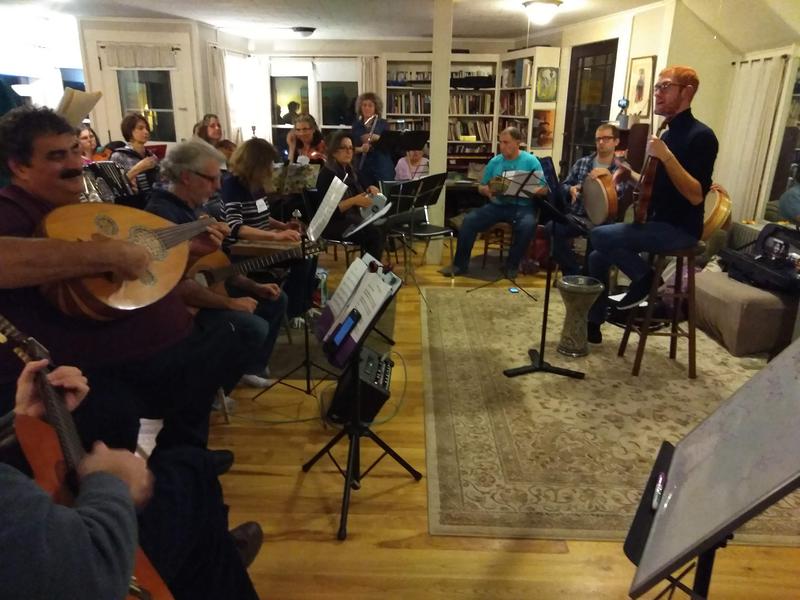
Members of the Pioneer Valley Arabic Music Ensemble, rehearsing in Northampton, Massachusetts. Photo by Jill Kaufman for NEPR
In a western Massachusetts newspaper a few months ago, a little announcement mentioned the startup of a Middle Eastern music group. No auditions were necessary: just an interest, an instrument, and a willingness to be directed.
New England Public Radio’s Jill Kaufman reports.
A New Play Takes the Audience to Barbershops Around the World
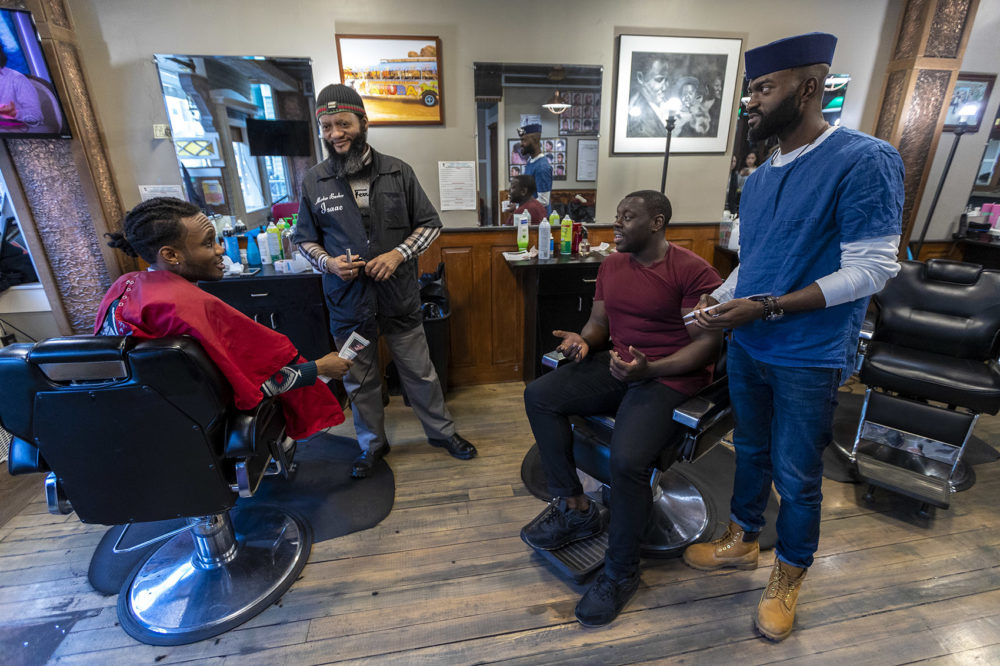
From right to left: Bright Genty and his father, master barber Isaac, speak with “Barber Shop Chronicles” actor Ekow Quartey and the production’s writer Inua Ellams at Headlines Unisex Barbershop in Cambridge. Photo by Jesse Costa for WBUR
A barbershop may just seem like a place to get a haircut, but in many places around the world, barbershops are safe spaces for men to form relationships with each other, outside of cultural expectations.
The new show, The Barbershop Chronicles, playing at the American Repertory Theater in Boston until January 5, 2019, takes audiences on a journey inside barber shops across the globe. WBUR’s Arielle Gray has our story.
Photo at the top of the page: Orlando sits in a plaza in Metapán, El Salvador. Photo by Jesse Costa for WBUR
About NEXT
NEXT is produced at Connecticut Public Radio
Host: John Dankosky
Producer: Lily Tyson
Digital Producer: Carlos Mejia
Senior Director: Catie Talarski
Contributors to this episode: Shannon Dooling, Annie Ropeik, Jill Kaufman, Arielle Gray
Music: Todd Merrell, “New England” by Goodnight Blue Moon, “Butter and Eggs” by Julian Lage and Chris Eldridge, “Middleman” by BrightEyes, “Snakes” by Susan McKeown
—
New to NEXT? You can find every episode or one you missed within our archives.
We need your feedback! Send critiques, suggestions, questions, and ideas to next@ctpublic.org. Help us spread the word! If you like what you hear, rate and review us on iTunes.

